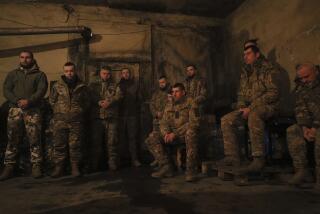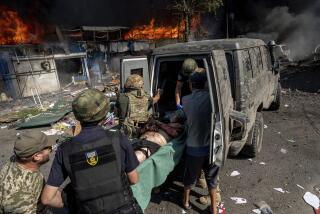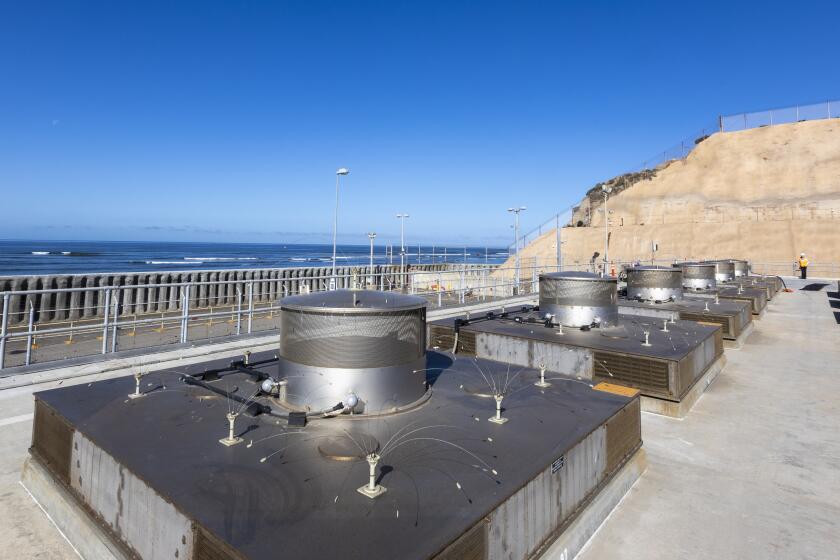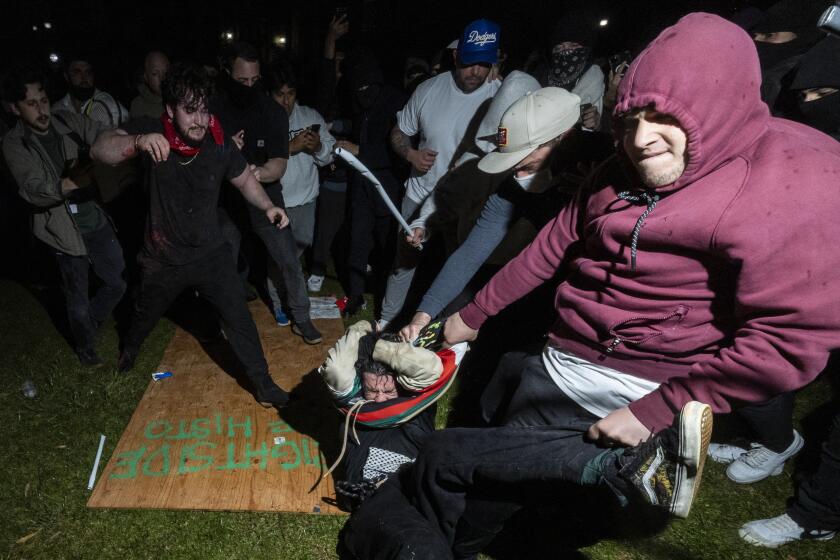Michael McFaul — an eye on Russia
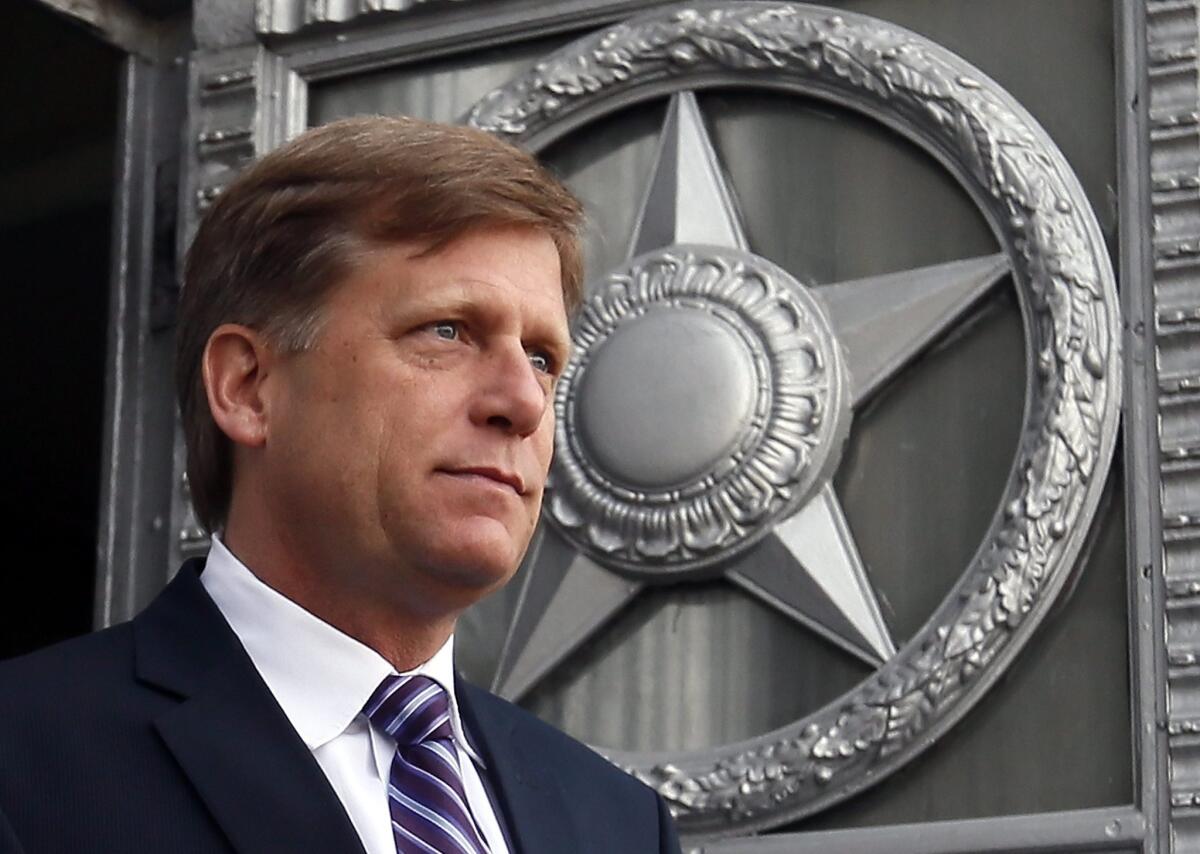
Michael McFaul was a scholar from Montana when he made his first trip to the West’s Cold War enemy, the Soviet Union. Thirty years later, he was President Obama’s chief Russia expert, then the United States ambassador in Moscow. He left the ambassadorship last month, after two years in the job, to return to teaching at Stanford University, his alma mater. In 1994, after a neo-fascist Russian figure denounced him, someone shot a bullet through his Palo Alto office window. Now the architect of Obama’s 2009 “reset” watches from a virtual window as Russia is once again on the outs with the West.
The shorthand for all of this is the “new Cold War.”
The way I would put it for now is, this is the end of the post-Cold War order. It’s not just a crisis that we’re all going to get over. For 30 years we have been trying to engage the Russian government, to integrate them into international institutions, and this is a moment where that era has ended. I think historians will look back on it as a major turning point. This is not just Russia versus the West in this particular drama. This is Russia versus everyone. It’s striking to me how isolated Russia is.
What should the West be watching for?
Violence in eastern Ukraine — not necessarily government-sponsored violence but between groups, individuals — that could spark an escalatory response. That’s what I’m most worried about moving forward.
Some U.S. conservatives cast the Crimea situation as Putin winning and Obama losing.
I find the debate about “he was weak, so that created a permissive condition” mostly to be ahistorical. The record of American presidents deterring Soviet and Russian aggression in Eastern Europe is a pretty poor one.
President [George W.] Bush did invade Iraq in 2003 and that did not stop Putin from invading Georgia. I don’t think anybody would call President Reagan weak when it came to the Soviets. Yet when an incredibly successful, peaceful democratic movement in Poland unfolded, and Leonid Brezhnev convinced or worked with [Polish leader Wojciech] Jaruzelski to declare brutal martial law, Reagan didn’t prevent that. President Johnson didn’t stop Soviets from rolling into Czechoslovakia in 1968. President Eisenhower could not deter the Soviets from going in to Hungary in 1956. Weak, strong, Republican, Democrat, long ago, recent — there’s a pretty consistent record here.
How do you think Putin perceives the U.S.?
I didn’t get the impression of a guy who thought we were weak. He assigned all kinds of power to the United States. He believes we were responsible for what happened in Tunisia that sparked the Arab Spring. He believes we’re responsible for the demonstrations against the falsified [election processes] in Russia in 2011 and into 2012. They had zero support from us, but that’s what he believes. He believes the United States was behind what he considers to be an illegal coup against [Ukrainian] President [Viktor] Yanukovich. I think Putin looks at the United States as a rather threatening force around the world and to Russia.
And how does the U.S. perceive Putin?
I think President Obama has a pretty accurate idea of who Putin is and how he thinks. I don’t think there’s naivete, but as a leader, you want to try to advance your interests and move forward, right? So is President Obama guilty of [trying] to [do that] with President Putin on issues of mutual interest? Yes, but not out of some naive notion or mis-assessment of the probabilities of success.
Who is Putin playing to?
Putin’s just focused within Russia. And that is a big change, probably one of the most important changes between pre- and post-Crimea.
Before going into Crimea, it is clear to me he did care [about world opinion]. He released [opposition oligarch] Mikhail Khodorkovsky from jail; he let two Pussy Riot singers out of jail; he threw this incredibly extravagant Olympics to say, “This is the new Russia.” And then all that is thrown away to go into Crimea. That tells me he’s shifted, that he’s decided not to care what the West thinks, he’s going to go his own way, with lots of nationalistic rhetoric. I think this is the way it’s going to be as long as President Putin is in power.
Did he think his hand was forced?
He was not forced. It was a cost-benefit analysis. There were many ways he could have handled this, and in Russia’s long-term national interests, this is a complete disaster. I don’t think this is going to make Russia stronger, more respected. Putin’s dream of a Eurasian Union — his response to the European Union — is dead because there’s no way the rest of Ukraine will ever be interested in that. Ukraine was the crown jewel, the keystone to making that viable, because of its size, its economy. He may have picked up Crimea, but he’s lost Ukraine forever. That’s not a very good trade — a pawn for a queen.
Does any of this encourage Russian client states like Syria and Iran to thumb their noses at negotiations with the West?
The drama for the Iranian government is not division between Russia and the U.S. I think they have a bigger agenda in mind, which is normalization of relations with the United States.
With respect to Syria, if we’re talking about the chemical weapons destruction program, I think it will continue, because Putin personally is committed to that. I don’t think he would walk back from that, and it’s not in Russia’s national interest. I don’t suspect Russia of being an enthusiastic supporter of the Geneva II process, a [Syrian power] transition. I think that is dead in the water.
What happened to the “reset,” the relaunch of U.S.-Russian relations between Presidents Obama and Dmitry Medvedev?
The reset’s been over for a long time. I think it was a very successful initiative. When President Medvedev was there, we got a lot of things done that made Americans safer and more prosperous: supply routes to Afghanistan through Russia, which were vital to American national security in the wake of the operation against Osama bin Laden; sanctions against Iran, which would not have happened without a Russian vote; Russia’s membership in the World Trade Organization. The American national interest, that’s what the reset was about. The reset was never about better relations with Russia. Outcomes were what mattered. That continuity of cooperation we fought hard to maintain, but obviously Putin had a different attitude.
The old Soviet Russia, for all its military power, couldn’t provide its people with basic consumer goods. How different is the new Russia?
Moscow is a vibrant, rich society that has learned how to respond to consumer demand. That is radically different. That’s the biggest misperception that [Americans] continue to have. This is not a poor, inefficient, Soviet-style country. It’s rich and modernized. That’s why for me this is such a tragedy.
The Russians had a surge of nationalist feeling after the Crimea vote.
You’re right, there’s been a rallying-around-the-flag phenomenon, but there were also 50,000 people in the streets of Moscow protesting. Depending on how this goes, as people find it harder to travel, investment opportunities — there’s been a lot of money flowing out of Russia that’s going to have consequences for the economy — they will have that debate: Was it worth it?
What kind of ambassador should your successor be?
Someone who will execute the president’s policy, which is to engage with the Russian government on issues of mutual interest, but in parallel, to engage with civil society, members of business, nongovernment organizations.
You broke ground by being immensely active and visible on Twitter in Russia. How is your account doing now?
I haven’t had as much time with all of this, but I think I’m up to about 65,000 [followers]. The rhetoric from the Russians has changed dramatically, in a negative way. I’d had my ups and downs with various Russian commenters. When I left it was a positive, nostalgic moment. I think I had 1,000 tweets about how “we’re going to miss you, Michael.” The tone has changed.
But I’m still there, trying to pull down some mythologies and bring historical context and facts into the debate.
This interview was edited and excerpted. patt.morrison@latimes.com Twitter: @pattmlatimes
More to Read
A cure for the common opinion
Get thought-provoking perspectives with our weekly newsletter.
You may occasionally receive promotional content from the Los Angeles Times.
